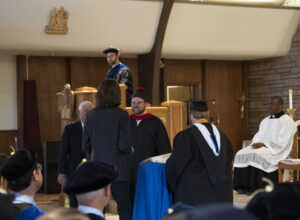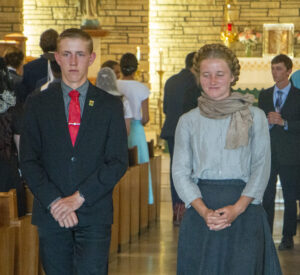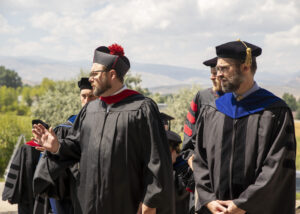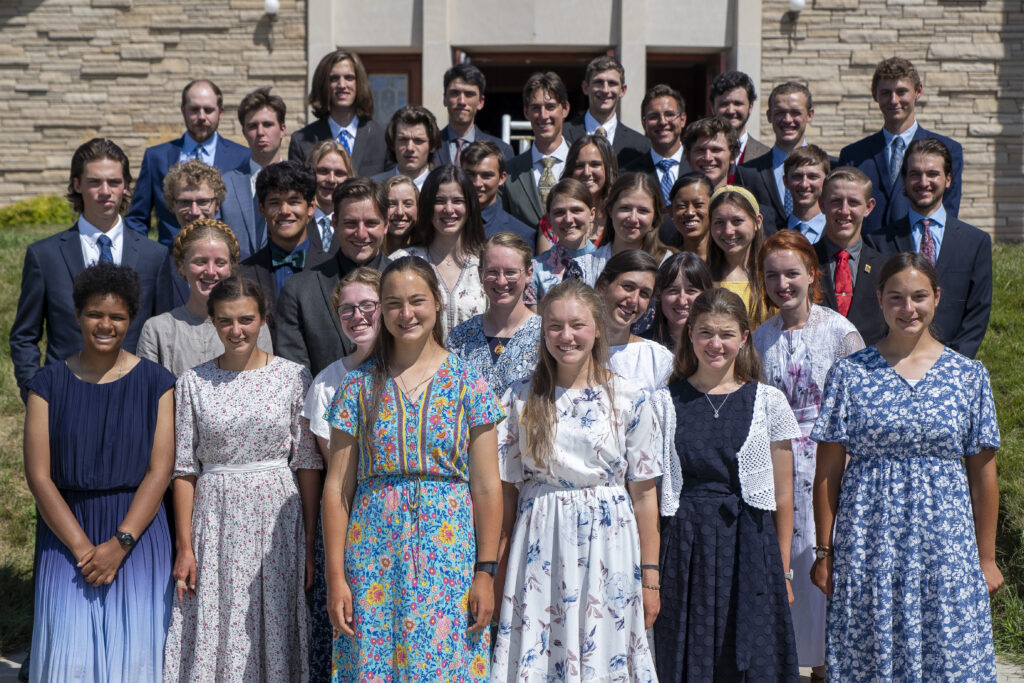Matriculation Remarksby Dean Scott OlssonAugust 25, 2024
The feeling of ignorance is a precious gift. The awareness of ignorance is like waking up to find a carefully wrapped present under the tree. You may not yet know what is waiting for you, but it can mean only one thing: someone loves you.
Thank you, President Washut.
I also want to thank Dr. Jeremy Holmes. Dr. Holmes generously served as our Academic Dean last year and helped me transition into this role, both before and after the loss of his son and our friend, Isaiah. Dr. Holmes gave me some good advice about this speech, which I think you will appreciate. He said, “keep it short.” Thank you, Dr. Holmes.
Dear freshmen, my comments will be primarily directed to you. After all, you will be signing your names today. But of course I’m also speaking to you returning students; think of this as an opportunity to renew your commitment to our college.
Since I want to get this right, I’ve written down my opening remarks and I will read them to you directly from my notes. Please pay careful attention.
διὰ γὰρ τὸ θαυμάζειν οἱ ἄνθρωποι καὶ νῦν καὶ τὸ πρῶτον ἤρξαντο φιλοσοφεῖν, ἐξ ἀρχῆς μὲν τὰ πρόχειρα τῶν ἀτόπων θαυμάσαντες, εἶτα κατὰ μικρὸν οὕτω προϊόντες καὶ περὶ τῶν μειζόνων διαπορήσαντες, οἷον περί τε τῶν τῆς σελήνης παθημάτων καὶ τῶν περὶ τὸν ἥλιον καὶ ἄστρα καὶ περὶ τῆς τοῦ παντὸς γενέσεως. ὁ δ᾽ ἀπορῶν καὶ θαυμάζων οἴεται ἀγνοεῖν (διὸ καὶ ὁ φιλόμυθος φιλόσοφός πώς ἐστιν: ὁ γὰρ μῦθος σύγκειται ἐκ θαυμασίων): ὥστ᾽ εἴπερ διὰ τὸ φεύγειν τὴν ἄγνοιαν ἐφιλοσόφησαν, φανερὸν ὅτι διὰ τὸ εἰδέναι τὸ ἐπίστασθαι ἐδίωκον καὶ οὐ χρήσεώς τινος ἕνεκεν.
 Now, whatever you might be thinking about this passage, hold those thoughts. We will return to them shortly.
Now, whatever you might be thinking about this passage, hold those thoughts. We will return to them shortly.
This is Matriculation. What does the word matriculation mean? The Latin word matricula is the diminutive form of the Latin word matrix, so a matricula is a little matrix. In its earliest meaning, the Latin word matrix means a mother. A bit later, matrix came to mean a list or a public register, but still later it came to mean a womb, as in a mother’s womb. It’s no accident that you can hear the similarity in the Latin words mater, materia, matrix; the Greek μήτηρ (meaning mother), and our English mother, matter, material. Now, if you look at a family tree of languages, at least the best that linguists can make out, you’ll see that English, Greek, and Latin are actually only distantly related. These connections probably originate at least four thousand years before Christ. Mama has been important to us humans for a very long time.
Freshmen, in just a few minutes, you will sign your names in this leather book, this matricula, this public register, this little womb. With your signature, you will be inserting yourself formally into the womb of your new mother, Wyoming Catholic College. We formally mark this today, but the College is already your nourishing mother or, as we say in Latin, your Alma Mater. After the signing, we will sing together the college’s hymn, which is called the Alma Mater. It ends by invoking our Blessed Mother, the Blessed Virgin Mary, to be our help so that we might follow her son.
What does it mean that the college is now somehow your mother?
It’s really quite a strange image. You all selected this college. You had choices. You made comparisons. You thought Wyoming Catholic College was the best option for your particular circumstances. So how can we call the college your mother? You chose Wyoming Catholic, but the first and the most obvious thing about a mother is that we do not choose our mothers. So what are we doing here? I can’t help but think of Nicodemus speaking with Jesus early in John’s gospel: “How can a man be born,” he asks, “when he’s already old? Surely he can’t go back into his mother’s womb to be born again?” Like Nicodemus, we are understandably a little confused.
 Thinking of our mothers now, we recall their sacrifices and their generosity. They preferred our good to their own. But forget all that for a moment, because those things were perceived by you only later. The striking thing about our first having a mother is that we weren’t even aware of it. Back then, just as now, having a mother was about urgently needing something you didn’t even know that you needed. We were helpless and unaware of our helplessness.
Thinking of our mothers now, we recall their sacrifices and their generosity. They preferred our good to their own. But forget all that for a moment, because those things were perceived by you only later. The striking thing about our first having a mother is that we weren’t even aware of it. Back then, just as now, having a mother was about urgently needing something you didn’t even know that you needed. We were helpless and unaware of our helplessness.
You don’t remember, but you were afraid. You were uncomfortable. You cried for your first breath. But you didn’t just cry in fear. You cried because you knew in your bones that, at that moment, now safely beside your mother, it was time for you to fill up your lungs, to take in the world so that you might grow strong. And this is why, on hearing that first cry, every mother is overcome with relief and joy.
Okay, why did I read you that Greek passage to start this address? It was not to suggest to you, falsely, that I am so very smart. Professors Hill and Cooper will be gently correcting my Greek pronunciation after the ceremony. No. Forgive me. I simply wanted to arouse in you a certain feeling: I wanted to arouse in you the feeling of ignorance. I wanted to, so to speak, put you back to that first moment, when you heard your mother’s voice. You heard her voice, and yet you had absolutely no idea what she was saying to you. Assuming you did not understand what I was reading, what did you feel? How did you react?
It so happens, dear students, that in the passage I read, which you will read your senior year, Aristotle is talking about ignorance. He connects ignorance to our marveling at reality and to what the Greeks called ἀπορία. This ἀπορία is a state of helplessness, a lack of resources; ἀπορία is being perplexed; it literally means the lack of passage—there seems to be no place to go, in or out. We feel our ignorance, Aristotle says, when we marvel at creation and when we feel helpless. “It is because of wonder,” he says, “that men now begin, and at first began, to philosophize.” It is no accident that you have begun your time at Wyoming Catholic in God’s wilderness. You experienced wonder. It might have happened that, on your 21 day expedition, you got lost a few times. That was the ἀπορία part.
 The truth is that, in comparison to what we can know, we are all astonishingly ignorant. That is why we are all here. We are not here because we already know, but because we desire to know. This fact is as true for the students as it is for the faculty and staff.
The truth is that, in comparison to what we can know, we are all astonishingly ignorant. That is why we are all here. We are not here because we already know, but because we desire to know. This fact is as true for the students as it is for the faculty and staff.
The question is what are we going to do with this ignorance? Students, what will you do this year when you realize that you do not know? And I hope that you do realize this! Will you, with our beloved Aristotle, be moved to philosophize?
That feeling of ignorance is generally misunderstood. It’s really quite shocking how little most people seem to know about ignorance!
Consider mathematics. Students tend to think mathematics is hard because they feel their own ignorance. At the same time, they might think theology is easy, because they don’t feel their ignorance. Of course, the truth is exactly reversed. Math is much easier than theology in large part because it is so obvious to us when we don’t understand. Theology is not so simple, and so we are not aware of our profound ignorance. This is a great mercy. We would fall helpless, stupefied, if we clearly felt how little we understand about God. Mathematics is like ignorance training wheels. We need to spend time with it so that we can become sensitive to our ignorance and practice our response to that ignorance. So you see the more common error, which would have us run from ignorance, is a kind of fatalistic pessimism. Consider how many have said, “Oh, I was never very good at geometry, it’s so hard. But theology, say the Trinity, that’s easy—just think of God like a triangle!”
There are two significant mistakes here: it is a mistake to think of our perceived ignorance as something something bad, something we should fear or avoid. And it is a mistake to confuse the absence of perceived ignorance with the presence of understanding.
Perceived ignorance is something like hunger. We feel hungry because food is good for us. In the same way, the feeling of ignorance has a very definite purpose: it is urging us towards the good, in this case, it is urging us towards knowing.
 A great problem of our age is that we no longer feel ignorant. Of course we are ignorant, but we have become adept at not feeling it. Most often, I think we’re simply too distracted to notice. When I timed myself reading that Greek passage, it took a little over a minute. But I bet it felt much longer than that. We would rather avoid that feeling. Imagine a society that no longer felt hungry. Surely everyone would starve to death.
A great problem of our age is that we no longer feel ignorant. Of course we are ignorant, but we have become adept at not feeling it. Most often, I think we’re simply too distracted to notice. When I timed myself reading that Greek passage, it took a little over a minute. But I bet it felt much longer than that. We would rather avoid that feeling. Imagine a society that no longer felt hungry. Surely everyone would starve to death.
Hunger has a way of pushing itself into our attention, it shouts at us. But ignorance? Ignorance whispers. She requires some space. Some tranquility. Some introspection.
There is another way in which ignorance is like hunger. Like hunger, ignorance can be satisfied, and not always with the best food! We can think we’ve resolved a question when in fact we still don’t know. We can satisfy the desire to know with things that aren’t worth knowing, which are trifling, fleeting, vain. Coming to your studies or to a good conversation after scrolling on social media, is something like coming to dinner after an oversized bowl of ice cream. Nothing will taste as good as it should.
Dear students, protect the silence and the space in your life. These are the necessary preconditions for your experience of wonder and ἀπορία. Unless you realize that you do not know, you cannot act so that you will come to know.
Do not run from the feeling of ignorance. You mustn’t do this, any more than the hungry man should run from food. Pay attention to that feeling, and don’t misunderstand it. Do not be angry. Sometimes we can grow angry because we feel overwhelmed by these feelings of ignorance and helplessness; we may feel as if the truth is asking too much of us. You might hear upperclassmen sigh, this curriculum is impossible! Who can master it all? Of course it is impossible. Every discipline we study here exceeds every one of us. That is the point, just as the world exceeded you when you first left your mother’s womb. The curriculum, precisely insofar as it is difficult, is a sign of our esteem and respect for you all.
 And, most of all, when you feel ignorance, do not feel shame. Ashamed? If only you could understand how fortunate you are!
And, most of all, when you feel ignorance, do not feel shame. Ashamed? If only you could understand how fortunate you are!
The feeling of ignorance is a precious gift. The awareness of ignorance is like waking up to find a carefully wrapped present under the tree. You may not yet know what is waiting for you, but it can mean only one thing: someone loves you.
Who has implanted that thirst within you? What marvel of human psychology, from what font of the human mind does that “knowing of unknowing” spring forth? Dogs do not know that they do not know. It is God who has made us this way. He has woven this sensitivity into our very hearts, because he wants us to have all of his best gifts. He seeks us out, because he wants us to turn back and to ask him, “Lord, give me that water.”
But he approaches with a whisper. As you begin this academic year, listen carefully for these whispers.
What the child receives he receives through his mother, but those things do not come first of all from his mother. The mother receives them and passes them on to her child.
Likewise, what you will be receiving these next few years is not first of all from the college. We receive them and hand them on to you. As with a mother, the college will labor that you might grow strong—and stronger than you can presently know.
So when you hear that whisper, that invitation to knowing, be assured that we are here with you. Your Alma Mater is here for you. It is time to expand your chest, to let out that cry, and to fill up your lungs. The College rejoices. Thank you.


